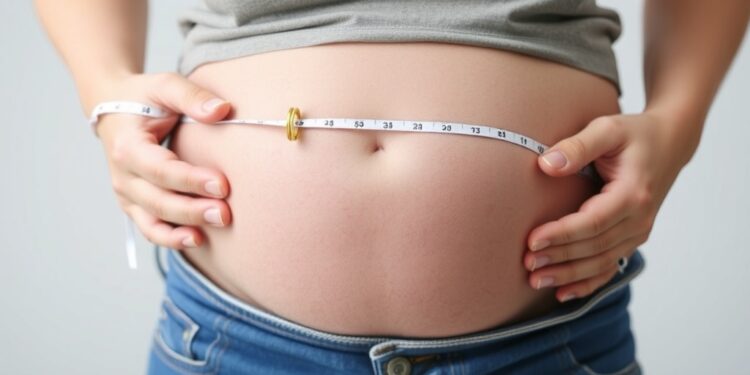New research presented at the European Congress on Obesity (ECO 2025) has highlighted an alarming correlation between sodium intake and obesity, both in terms of overall body fat and abdominal fat. The study, conducted by Annika Santalahti and her colleagues from the Finnish Institute for Health and Welfare, draws upon extensive population-based data and reveals critical insights into how dietary sodium impacts obesity risk, making it a vital topic for further exploration in public health and nutritional science.
The research introduces two key concepts in understanding obesity: general obesity, defined by a body mass index (BMI) of 30 kg/m² or more, and abdominal obesity, which pertains to the accumulation of fat around the abdomen and internal organs that increases waist circumference. The World Health Organization (WHO) has raised concerns about the implications of abdominal obesity, linking it to an increased risk of cardiovascular diseases, which makes this research particularly timely and important.
Finland has experienced a significant dietary shift regarding sodium intake over the past several decades. Despite a moderate decrease in sodium consumption since the 1970s, when Finland had some of the highest heart disease mortality rates globally, sodium intake patterns have stabilized since 2007. Unpacking this trend, the researchers discovered that contrary to popular belief, the primary sources of high sodium levels in diets are often ordinary food items rather than fast or processed foods. Processed meats, various types of bread, and dairy products, notably cheese, account for the majority of sodium consumption in Finland, raising questions about food production and public health interventions.
The study meticulously analyzed a population of Finnish adults, examining their sodium intake as well as urine sodium concentration in relation to their obesity status. Utilizing data from the National FinHealth 2017 Study, featuring over 5,000 men and women aged 18 and older, researchers employed validated food frequency questionnaires to estimate sodium intake and collected urine samples to examine sodium concentration levels. This approach allowed for a multi-faceted exploration of the relationship between sodium consumption and obesity metrics.
One of the more startling findings was that nearly all quartiles of participants exceeded the recommended sodium intake of 5 grams or less per day, set by WHO, with only women in the lowest quartile falling below this threshold. The median sodium intake for participants in the highest quartile was found to be alarmingly high, about 4900 mg/day for men and 3750 mg/day for women. This translates into more than 12 grams of salt per day for men and almost 9 grams for women—an excess that poses risks not only for obesity but for overall health wellbeing.
The analysis revealed strong correlations between high dietary sodium intake and both general and abdominal obesity, particularly for women. Participants in the highest sodium intake quartile were 4.3 times more likely to be classified as obese overall and 3.4 times more likely to suffer from abdominal obesity. With similar patterns observed when urine sodium concentration was assessed, these findings suggest a robust and reproducible relationship between sodium intake and obesity across both dietary assessments.
For men, the evidence followed a parallel trend, revealing elevated risks associated with increased sodium intake. Although the correlations were less statistically significant across all quartiles when assessed by food questionnaire, urine sodium concentration demonstrated a pronounced association. Specifically, men in the highest quartile of urine sodium concentration were six times more likely to experience general obesity and 4.7 times more likely to have abdominal obesity. Such results indicate that even modest increases in sodium intake can substantially raise obesity risk.
The researchers noted that validity analyses comparing spot urine samples with comprehensive 24-hour urine collections indicated a reasonable agreement between the two measures of sodium intake, suggesting that spot urine readings could effectively categorize subjects’ sodium consumption levels. This is a crucial development, as it simplifies the methodology for gauging dietary sodium and its effects on obesity.
Intriguingly, the authors speculate that the stronger associations observed in men could be attributed to their overall higher caloric intake. They contend that men typically consume larger quantities and greater proportions of sodium-rich foods, such as processed meats and bakery products, relative to their energy intake. This nuance highlights the interaction between dietary metabolism and obesity risk factors, underscoring that both biological and habitual dietary components must be considered.
The researchers conclude that the evidence tying sodium intake to obesity remains compelling, yet complex. They emphasize that there is still a pressing need to investigate the biological mechanisms underlying this relationship. The interplay between sodium, satiety hormones, food quality, and overall dietary habits could illuminate new pathways for understanding obesity and providing effective public health interventions.
What is clear from this comprehensive analysis is the essential role of the food industry in addressing high sodium consumption. With a significant proportion of sodium intake stemming from processed and packaged foods, strategies must be devised to reformulate these products for reduced sodium without compromising flavor or shelf life. Public awareness campaigns may also play a vital role in educating consumers about hidden sodium sources in their diets.
The findings invite further conversation about broader dietary paradigms and the societal structures around food production and consumption. They stress that a holistic approach to diet, encompassing not just sodium intake but overall nutrition quality, is necessary to combat the escalating obesity epidemic. This investigation serves as a critical wake-up call to stakeholders, policymakers, and the public alike to take actionable steps toward healthier dietary practices.
As the research unfolds in discussions and future studies, the ultimate aim remains clear: a healthier population, less burdened by the complications of obesity and its associated health risks.
Subject of Research: Relationship between Sodium Intake and Obesity
Article Title: High Sodium Intake Linked to Increased Obesity Risk, New Research Reveals
News Publication Date: 26-Mar-2025
Web References:
References:
Image Credits:
Keywords: Sodium Intake, Obesity, Abdominal Fat, Public Health, Nutrition, Dietary Guidelines, Processed Foods, Finland




